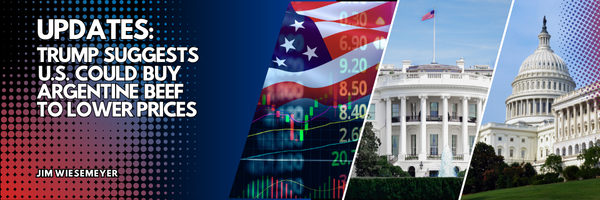
Trump Suggests U.S. Could Buy Argentine Beef to Lower Prices
President links move to efforts to fight inflation, boost Argentina’s economy
President Donald Trump said Sunday that the United States may begin purchasing beef from Argentina to help reduce prices for American consumers, according to the Associated Press. “We would buy some beef from Argentina,” Trump told reporters aboard Air Force One en route from Florida to Washington. “If we do that, that will bring our beef prices down.”
The president’s remarks follow his pledge earlier this week to tackle stubborn food inflation. U.S. beef prices have remained elevated due to drought conditions and reduced imports from Mexico, where a flesh-eating pest has affected cattle herds.
The proposal also comes as Trump deepens financial ties with Argentina. His administration is supporting President Javier Milei with a $20 billion currency swap line and additional sovereign and private-sector financing to stabilize the South American nation’s struggling economy ahead of midterm elections there.
Trump’s declaration in the White House earlier this week that he has a “deal” to lower beef prices stirred speculation across the cattle and meatpacking industries. “We are working on beef, and I think we have a deal on beef,” Trump told reporters at the White House on Oct. 16.“The price of beef is higher than we want it, and that’s going to be coming down pretty soon too. We did something.” He offered no further explanation of what that “something” entailed.
Trump’s remarks came as beef prices hit record highs, driven by a 75-year-low in the U.S. cattle herd, years of drought, and surging feed and fuel costs. The U.S. Cattlemen’s Association (USCA) quickly responded (see box for details), emphasizing that consumer prices reflect the real costs ranchers are enduring. “Ranchers are facing historic highs for feed, fuel, labor, and land — and those costs have risen far faster than beef prices on grocery shelves,” said USCA President Justin Tupper. The NCBA has not yet reacted.
Behind the scenes, sources close to the administration say the Department of Justice and USDA are finalizing a joint initiative targeting antitrust enforcement and price transparency in the beef supply chain. RFD-TV reported that the agencies are working on an agreement to “ensure competition in key farm sectors,” with the goal of easing pressure on consumers and rebuilding the U.S. cattle herd.
Still, market fundamentals remain a challenge. With the national herd near its smallest since 1951, rebuilding production capacity will take years, not months. And while antitrust action could address packer concentration, analysts caution that such steps alone may not lead to lower consumer prices in the near term.
Industry observers are watching for follow-up statements from USDA Secretary Brooke Rollins and from major meatpackers like Tyson Foods, Cargill, and JBS USA, which could clarify whether the “deal” involves voluntary pricing or transparency commitments.
Of note: Feeder cattle and live cattle futures both dropped on Friday, Oct. 17. Live cattle futures closed $6-$7 lower for the day, and feeder cattle futures closed limit lower at $9.25.
| One U.S. cattle group pushes back on Trump’s beef price remarksIndustry group warns that political comments risk market volatility, urges focus on real costs and rancher realities The U.S. Cattlemen’s Association (USCA) issued a sharp response to President Donald Trump’s recent comments pledging action on beef prices, cautioning that the discussion risks distorting the economic realities behind today’s market. “The cost of producing beef today is accurately represented in the consumer markets where it is sold,” said USCA President Justin Tupper, emphasizing that ranchers face record highs for feed, fuel, labor, and land — expenses that have outpaced retail beef price increases. The association highlighted that the national cow herd hit a 75-year low earlier this year, a major driver of price dynamics. With the average age of producers climbing and many younger generations leaving the business, “raising cattle in this environment has required extraordinary commitment and innovation from family operations across the country,” USCA noted. Despite these pressures, beef remains an affordable staple. Adjusted for earnings, consumers still spend about 12 minutes of work for a pound of ground beef — unchanged since the 1980s. Tupper contrasted this with the cost of a daily coffee, calling beef “an incredible deal” given its high nutritional value. The group also warned that White House commentary can spark market volatility, threatening ranchers’ financial stability. “When policymakers hint at intervention or suggest quick fixes, they can shake the market’s foundation and directly impact the livelihoods of ranchers,” Tupper said. USCA urged policymakers to prioritize transparency and market integrity rather than price mandates or reactive interventions. “Efforts to support consumers must consider the economic realities on the ground and ensure the voices of independent ranchers lead the discussion,” Tupper added. The association reaffirmed its readiness to work with the administration and Congress on “solutions grounded in the lived experience of America’s ranching families.” |
| Jim Wiesemeyer | 43001 Vestry Court, Broadlands, VA 20148UnsubscribeUpdate Profile | Constant Contact Data NoticeSent by wiesemeyer@gmail.com powered by |


